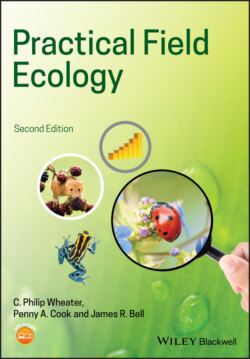Читать книгу Practical Field Ecology - C. Philip Wheater - Страница 15
Choosing a topic for study
ОглавлениеThe first stage of a research project is choosing a subject area in which to research (see Box 1.1 for a list of some texts that include ecological project ideas). As you will be devoting substantial time to your project, it is important to choose a topic that interests you. You may also wish to make your research relevant to your current or future employment. A variety of organisations – local, national, and international – may be able to help you identify an area of interest that is also of current relevance. Such organisations include local authorities and wildlife trusts, nature reserves, museums, and (inter)national bodies such as the RSPB, Plantlife, and WWF (Naturenet provides a list of some such organisations that may be able to help).1 Pick a topic of the right size: neither too big nor too small – typically the fieldwork component of most undergraduate projects are less than 6 weeks in length. Looking at successful previous projects may assist you in judging how much can be done in the available time (ask more experienced researchers for examples of good projects to look at). Finally, your proposed project has to be feasible; for example, in terms of equipment, access to sites, and realistic timescales. Once you have selected your subject and provisional title, be prepared to be flexible and, if necessary, to change direction. This may happen for a variety of reasons; for example, if a pilot study reveals a more interesting avenue for research, or if your original ideas turn out to be unfeasible. You should note that the planning process should involve a consideration of the whole project to enable you to identify and deal with any potential problems before they become major issues (see Figure 1.1). In all aspects, reading around the subject will allow you to use appropriate techniques, build on existing knowledge, and avoid reinventing the wheel. Inevitably, there can be logistical problems that influence your choice of site, or species, or otherwise prevent you from proceeding exactly as you would have wished. Although you can avoid many such problems by careful planning, there are some aspects that you will not think about until you implement the research. A pilot study will help to identify such issues and may allow you to refine the study in advance of full implementation. If you are unable to do a pilot study, at least try to explain your approach to someone who has spent time doing ecological fieldwork. They may highlight some obvious deficiencies. This is particularly useful for field trips abroad, which preclude a pilot and can be fraught with difficulty.
Figure 1.1 Flowchart of the planning considerations for research projects.
